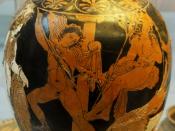Through the character of Oedipus, Sophocles shows the futility and consequences of defying the divine order. Oedipus served Thebes as a great ruler, loved by his subjects; but it is his one tragic flaw, arrogance, which dooms his existence, regardless of the character attributes that make him such a beloved king.
From the opening dialogue we sense the character of Oedipus. When confronted by his subjects praying for relief of the plague he reacts kingly and graciously, saying, "I am king, I had to come....How can I help?...Ask me anything. Anything at all." He obviously cares for the people in his kingdom, but he goes on to say how he pities "these poor shattered people of [his]." The pity he feels is based not only in his love and sympathy, but also his arrogance. Maybe this attitude is deserved, for Oedipus had solved the Sphinx's riddle, an apparently heroic feat, and was seen to be "greater than any man", but the leader that he had become still possessed the arrogant tendencies that doomed him from the time he fled Corinth.
It is impossible to imagine what may have happened to Oedipus if he had stayed in Corinth, but it is the attempt to avoid his fate that dooms him not only to fulfill the prophecy, but to suffer yet greater consequences. To think that he himself has the power to avoid the prediction from the Oracle of Apollo, shows that he did not feel humbled before Apollo. Punishment for this lack of faith takes the form of the plague which Apollo imposes on Thebes, an eventual consequence of Oedipus' defiance and arrogance towards him. (The death of Laios at the crossroads, was caused by Oedipus leaving Corinth.) The punishment of all of Thebes is infinitely worse than the original...


